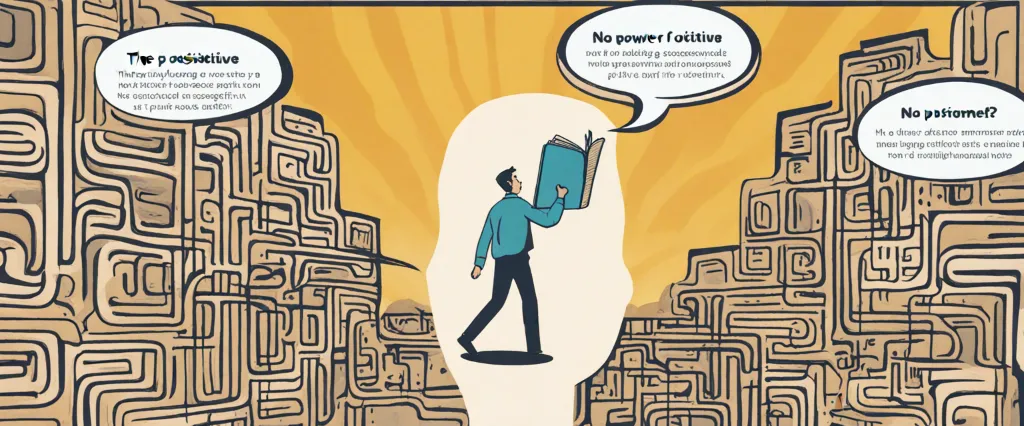——The Power of a Positive No by William Ury & Ethics for the Real World by Ronald A Howard

In a world filled with countless decision-making dilemmas, navigating the vast spectrum of choices can be a daunting task. Whether it is negotiating a difficult situation, establishing personal boundaries, or grappling with moral quandaries, we often look to books as valuable companions on our journey towards self-improvement and introspection. Two such books that attempt to guide us through the intricate realms of interpersonal communication and ethical decision-making are “The Power of a Positive No” by William Ury and “Ethics for the Real World” by Ronald A Howard.
“The Power of a Positive No” serves as an illuminating manual for effectively saying no, a skill that, at times, eludes even the most adept among us. Ury, co-founder of the Harvard Program on Negotiation, is widely recognized for his expertise in the field of negotiation and conflict resolution. Through his book, he offers a refreshing perspective on asserting boundaries and asserting oneself with conviction, all while maintaining constructive relationships with others.
On the other hand, “Ethics for the Real World” dives into the complexities of ethical decision-making, exploring the various moral dilemmas that arise in our everyday lives. Ronald A Howard, an esteemed professor of management science and engineering at Stanford University, combines his academic expertise with real-world examples to present a compelling case for ethical behavior. Through this book, Howard aims to equip readers with the tools necessary to navigate the often murky waters of ethical decision-making in both personal and professional contexts.
While both books tackle distinct aspects of human behavior, they share the underlying objective of guiding individuals towards making informed choices that align with their values. As such, a comparative study of “The Power of a Positive No” and “Ethics for the Real World” promises to shed light on the interplay between assertiveness, interpersonal relationships, and ethical decision-making.
Through an exploration of the strategies and techniques presented in these two works, this study intends to examine the strengths and weaknesses of each approach, analyzing their applicability in various scenarios. Moreover, it aims to highlight the similarities and differences between the perspectives offered by Ury and Howard, thereby aiding readers in their quest for personal growth, effective communication, and ethical conduct.
By undertaking this comparative study, we seek to unravel the critical lessons offered by these two remarkable books, enabling readers to harness the power of a positive no while navigating ethical challenges with grace and integrity. Ultimately, it is our hope that the insights derived from this exploration will empower individuals to assert their boundaries with confidence and make ethical decisions that uphold their principles.
Brief Summary of Two Books
The Power of a Positive No by William Ury
“The Power of a Positive No” by William Ury is a self-help book that teaches readers how to say “no” effectively and respectfully while still maintaining positive relationships and achieving personal goals. Ury, known for his expertise in negotiation and conflict resolution, introduces the concept of a “Positive No” as a way to assert one’s needs and boundaries without damaging relationships.
The book outlines a practical framework for saying no, emphasizing the importance of clarity, respect, and empathy. Ury proposes a three-step process: first, “Yes! – What do I stand for?” encourages readers to clarify their own values and priorities, enabling them to make decisions aligned with their personal goals. Second, “No! – What is unacceptable to me?” guides readers through the art of skillfully declining requests while maintaining a positive and assertive stance. Ury advises readers on various techniques, such as using “I” statements and finding mutually acceptable alternatives. Finally, “Yes? – What is my constructive proposal?” encourages readers to offer alternative solutions or compromises that satisfy both their needs and the other party’s interests, fostering collaboration and avoiding unnecessary conflicts.
Ury shares numerous examples and real-life stories to illustrate the transformative power of a Positive No in various scenarios, including personal relationships, work settings, and global conflicts. Throughout the book, he emphasizes the importance of effective communication, active listening, and building strong relationships based on mutual respect and understanding.
The book serves as a practical guide for readers seeking to assert themselves in a positive and constructive manner. It empowers individuals to create boundaries, protect their interests, and achieve their personal and professional goals while maintaining healthy relationships. Ultimately, “The Power of a Positive No” equips readers with effective negotiation skills that can lead to more fulfilling and harmonious interactions in all areas of life.
Ethics for the Real World by Ronald A Howard
“Ethics for the Real World” by Ronald A Howard, co-authored with Clinton D. Korver, is a practical guide to ethical decision-making in everyday life and business situations. The book aims to help readers navigate the complexities and dilemmas of modern society by providing a framework for moral thinking.
In this book, Howard and Korver emphasize the importance of responsible decision-making and offer a step-by-step approach to ethical reasoning. They argue that ethics is not just an abstract concept but a practical tool that should be used to address real-world challenges. The authors provide numerous case studies and real-life examples to illustrate their points and demonstrate how ethical considerations can be applied in various situations.
The book covers a range of topics, including personal integrity, honesty, trust, fairness, and social responsibility. It also addresses issues such as conflicts of interest, whistleblowing, and ethical leadership. Howard and Korver encourage readers to consider both the short-term and long-term consequences of their actions, as well as the potential impact on different stakeholders.
One of the key messages of “Ethics for the Real World” is that ethical decision-making is not always easy, and there may not always be a clear-cut solution. The authors emphasize the importance of critical thinking, open-mindedness, and considering different perspectives when facing ethical dilemmas.
Overall, “Ethics for the Real World” offers a practical approach to ethics that can be applied by individuals, leaders, and organizations alike. It provides readers with tools and strategies to navigate moral challenges and make ethical decisions that align with their values and create positive outcomes for themselves and others.
Comparison between Two Books

Similarities in Decision-making
“The Power of a Positive No” by William Ury and “Ethics for the Real World” by Ronald A. Howard both explore the concept of decision-making and its ethical implications. Despite their different focuses, these books share several similarities in their approach to decision-making:
1. Ethical considerations: Both books emphasize the importance of ethical decision-making. They argue that decisions should be made with a keen awareness of the potential consequences and impact they may have on others. Ury and Howard advocate for decisions that are fair, just, and respectful of all parties involved.
2. Clarity and communication: Decision-making is seen as a process that requires clarity and effective communication. Ury and Howard stress the need for transparency and thorough understanding when making decisions. They advocate for clear communication of intentions, needs, and concerns to foster a fair and respectful decision-making process.
3. Negotiation and compromise: Both authors acknowledge that decision-making often involves negotiating with others and finding a middle ground. Ury, in particular, highlights the importance of saying “no” assertively while still leaving room for negotiation and compromise. Similarly, Howard emphasizes the need to consider multiple perspectives and find mutually agreeable solutions.
4. Value-driven decisions: Ury and Howard emphasize making decisions based on core values and principles. They argue that decisions should align with personal or organizational values to maintain integrity and ethical grounding. Both books advocate for decision-makers to reflect on their values and ensure they are driving their choices.
5. Long-term consequences: Both texts emphasize the need to consider the long-term consequences of decisions. Ury focuses on how saying “no” in the short term can lead to better outcomes in the long run, while Howard delves into the potential ethical and societal implications of decisions. They stress the importance of considering the broader impact of decisions beyond immediate needs and desires.
In summary, both “The Power of a Positive No” and “Ethics for the Real World” approach decision-making with a focus on ethics, clear communication, negotiation, value-driven choices, and consideration of long-term consequences. By integrating these principles, individuals can make well-informed decisions that align with their values and have a positive impact on themselves and others.
Divergences in Decision-making
Both The Power of a Positive No by William Ury and Ethics for the Real World by Ronald A. Howard provide valuable insights and guidance for decision-making. However, there are certain divergences in their approaches that can be identified.
One major divergence lies in the emphasis on assertiveness versus ethical considerations. In The Power of a Positive No, Ury highlights the importance of saying “no” effectively and assertively in order to protect one’s interests without damaging relationships. He provides strategies and techniques for maintaining a positive stance while still being able to assert boundaries and stand up for one’s needs.
On the other hand, Ethics for the Real World prioritizes ethical decision-making and the evaluation of moral consequences. Howard emphasizes the importance of ethical principles, such as honesty and fairness, in decision-making. He encourages readers to consider the impacts of their choices on various stakeholders and the wider societal implications.
Another divergence can be found in the frameworks presented for decision-making. The Power of a Positive No offers a five-step strategy for saying “no” effectively: showing appreciation, building rapport, offering a “no,” proposing a “yes” to an alternative solution, and ending with a positive note. Ury emphasizes effective communication and negotiation techniques.
In Ethics for the Real World, Howard presents a framework known as “four universal moral principles”: utility, rights, justice, and virtue. These principles help individuals assess the ethical aspects of their decisions and ensure they align with the common good. Howard advocates for a deep analysis of the potential consequences, ethical obligations, and virtues associated with a decision.
Ultimately, while both books provide valuable insights into decision-making, The Power of a Positive No primarily focuses on assertiveness and negotiation techniques, while Ethics for the Real World centers on ethical principles and moral consequences.

Conclusion
Both “The Power of a Positive No” by William Ury and “Ethics for the Real World” by Ronald A Howard are valuable books, but it ultimately depends on your personal interests and goals. Here is a brief overview of each book to help you decide:
1. “The Power of a Positive No” by William Ury: This book primarily focuses on negotiation techniques and communication skills. It provides practical strategies for setting boundaries, saying no effectively, and reaching win-win outcomes in various situations. If you are interested in improving your negotiation skills and learning how to assert yourself without damaging relationships, this book would be a great choice.
2. “Ethics for the Real World” by Ronald A Howard: This book explores ethical decision-making in everyday life. It delves into various ethical dilemmas and provides frameworks for approaching them in a principled way. If you are interested in ethical reasoning, moral philosophy, and understanding how to navigate ethical challenges personally and professionally, this book would be an excellent choice.
In summary, if you are more interested in negotiation skills and assertiveness, “The Power of a Positive No” by William Ury would be more suited to your needs. On the other hand, if you are interested in ethical decision-making and moral philosophy, “Ethics for the Real World” by Ronald A Howard would be a better pick.



